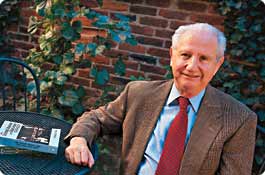On Sept. 11, as horrified Americans watched commercial airliners barrel into the World Trade Center and the Pentagon, the life's work of Dennis Kux '52 suddenly became vastly more valuable to those citizens-and the news outlets that inform them.
Kux parlayed 39 years of experience in the U.S. State Department, particularly his expertise on South Asia, into a second career beginning in 1994 as a highly acclaimed author of books and articles about the United States' relations with India and Pakistan.
In the aftermath of the terrorist attacks, people who'd ignored the rise of Afghanistan's repressive Taliban regime-and the politics of its neighboring nations-suddenly found themselves with a new vocabulary and a burning desire to learn more about the forces that led to the terrorist attack.
Kux has been interviewed on three television networks and National Public Radio and given lectures at more than a dozen clubs, colleges, and other organizations. His comments also appeared in a number of newspapers, including The Washington Post. “It's a very, very fluid situation,” he says. “The talk changes each time, but the background remains the same.”
Reporters asked: Why did Pakistan support the Taliban before switching its alliance in the wake of the attacks? How would Pakistani Muslims react to American bombs falling on Afghanistan?
For Kux, who has watched Pakistan founder since its birth nearly 55 years ago, many answers lie in the nation's history of conflict with India and in the uneven treatment it has received from the U.S.
Kux, who visited Afghanistan several times when he was at the U.S. embassies in India and Pakistan, says the U.S. and other nations can't afford to turn their backs on Pakistan as they did on Afghanistan after the Russians left. “We didn't really try to help them form a stable government,” he says, explaining that in the case of Pakistan, “we and the rest of the world need to stay with them. If Pakistan becomes a failed state, it will make Afghanistan look like a kindergarten.”
Kux says that in order to keep Pakistan from becoming a place for conflict and terrorism to thrive, the U.S. must act as mediator between Pakistan and India.
Interest in Diplomacy Grew
The New York Times called his first book, India and the United States: Estranged Democracies, 1941-91, “the definitive history of Indian-American relations.” A companion volume, The United States and Pakistan 1947-2000: Disenchanted Allies, came out in summer 2001 and quickly proved far more timely than he had anticipated.
Kux says his interest in diplomacy and foreign policy began when he was a history major at Lafayette and took government classes taught by Eugene Parker Chase, a former State Department official. His interest grew, when, as a first lieutenant in the U.S. Army, he interrogated Korean, Chinese, and Japanese prisoners of war.
After receiving his master's degree at Fletcher School of Law and Diplomacy, Tufts University, he was hired by the State Department in 1955 to study and report on economic policy. In 1957, when he arrived at the U.S. Embassy in Pakistan, the heat was intense and the odds of contracting hepatitis were about one in four. By the end of his two-year assignment, Kux had fallen in love with the land, the people, and the complicated political and cultural history of South Asia.
Kux did a tour of duty in India, worked on South Asia policy in Washington, D.C., and worked two years in Bonn, Germany. He returned to Pakistan for another two-year tour in 1969, ending it as “unwitting control officer” for U.S. Secretary of State Henry Kissinger's secret trip to China, preceding President Richard Nixon's historic trip there.
New Book in Process
Kux spent the 1970s on a tour of duty in Turkey and back in Washington, D.C., as country director for India, Nepal, and Sri Lanka. He was named deputy assistant secretary for intelligence coordination in 1980, then deputy director for management operations in 1984. Two years later, he headed overseas again, this time as ambassador to the Ivory Coast. He speaks French, Russian, Hindi, Tamil, and Urdu.
When Kux returned to the United States in 1989, he continued his State Department career for another five years, then began work on his first book. He visited Uzbekistan in the late 1990s, and served as a fellow of the Woodrow Wilson International Center for Scholars from 1996-97. He is currently a senior scholar at the Wilson Center and executive director of the Asia Society's Council on Foreign Relations.
Kux adds that his new career hasn't kept him buried in the archives. He has returned to both Pakistan and India on Fulbright fellowships, and will return to India to work on his third book, which will address United States-India relations following the Cold War.

